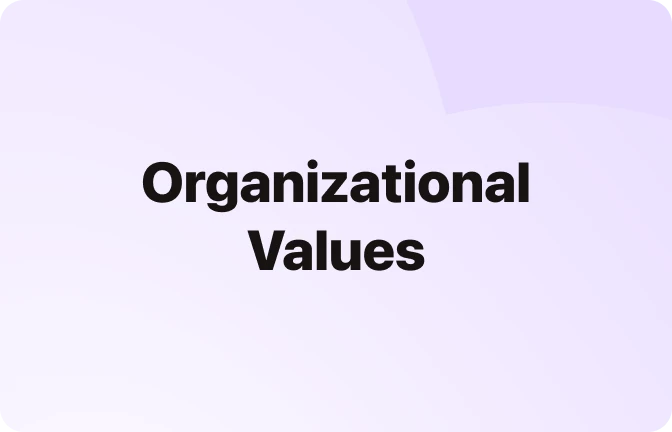Organizational values are essential principles and beliefs that guide a company’s operations, shaping its culture and setting the tone for interactions with stakeholders. These values provide purpose and direction, ensuring consistency in decision-making and actions across the organization. This article combines insights from two sources to explore what organizational values are, their significance, and how they can be effectively developed and communicated.
What Are Organizational Values?
The meaning of organizational values are the fundamental beliefs that guide a company’s behavior and decision-making. They are core principles that reflect the company’s identity and influence its culture. These values are unique to each organization and should be authentic, reflecting the company’s mission and vision. They serve as a framework for employees, guiding their actions and decisions.
Examples of Organizational Values
- Buffer: Buffer operates according to six core values: default to transparency, cultivate positivity, show gratitude, practice reflection, improve consistently, and act beyond yourself. These values are deeply embedded in their operations, with practices such as making salary and DEI data public.
- Kellogg’s: Kellogg’s core values include acting with integrity, accountability, passion for business, humility, and striving for simplicity. These values are communicated through specific actions that employees are expected to embody.
- Google: Google’s values are encapsulated in the “Ten Things We Know To Be True,” including focusing on the user, doing one thing well, and maintaining a fast-paced work environment. Each value is supported by detailed explanations, ensuring employees understand their application in the workplace.
The Importance of Organizational Values
Organizational values play a crucial role in people analytics meaning the practice of collecting and transforming HR data and organizational data into actionable insights that improve the way you do business. They help define the company’s identity and set it apart from competitors. According to research, 94% of executives and 88% of employees believe a distinct workplace culture, shaped by clear values, is vital for business success.
Benefits of Organizational Values
- Unity and Cohesion: Shared values create a sense of purpose and vision, fostering teamwork and collaboration among employees.
- Guided Decision-Making: Values provide a framework for decision-making, ensuring consistency and alignment with the company’s mission.
- Enhanced Employee Engagement: Employees who resonate with the company’s values are more likely to be engaged, motivated, and productive.
- Attracting and Retaining Talent: Clear values attract like-minded individuals and help retain employees who align with these values.
- Reputation Management: Strong values enhance a company’s reputation, building trust with customers, partners, and stakeholders.
- Competitive Advantage: Values differentiate a company from its competitors, offering a unique selling proposition.
- Innovation Stimulation: Promoting values like creativity fosters an environment conducive to new ideas and continual improvement.
Developing Organizational Values
Creating effective organizational values involves a thoughtful process that includes introspection, collaboration, and alignment with the company’s mission.
Steps to Develop Organizational Values
- Put a Team Together: Include the CEO, founders, and key employees who understand the company’s culture and mission.
- Brainstorm Values: Identify core beliefs held by the leadership and employees. Questions to consider include the organization’s purpose, desired behaviors, and existing values.
- Distill Values into a Short List: Condense the brainstorming results into a concise set of values that are easy to understand and remember.
- Get Leadership Sign-Off: Present the values to stakeholders for approval, ensuring they reflect the company’s vision and goals.
Types of Organizational Values
- Core Values: Fundamental principles that guide all actions and are non-negotiable.
- Aspirational Values: Values the company strives to embody but may not fully practice yet.
- Accidental Values: Values that have developed organically over time and may or may not align with the desired culture.
Communicating Organizational Values
Effectively communicating values is essential for embedding them into the company culture. Values should be more than just words on a wall; they should influence behavior and decision-making at all levels.
Methods to Communicate Values
- Posters and Displays: Regular reminders through visual aids in the workplace.
- Newsletters and Internal Blog Posts: Highlighting values through stories and employee shout-outs.
- Weekly Meetings: Emphasizing values in the context of goals and achievements.
Real-World Examples of Organizational Values
Examining how companies have successfully implemented and lived their values can provide valuable insights.
- Microsoft: Values include empowering individuals, respecting diversity, fostering collaboration, and operating with integrity.
- Salesforce: Built on a foundation of trust, focusing on relationships with customers, employees, and communities.
- Apple: Core values include innovation, design, and customer experience, driving their product development and brand identity.
- Google: Prioritizes user focus, speed, and ethical principles, contributing to their success as a leading tech company.
- JPMorgan Chase & Co.: Values include integrity, excellence, and teamwork, guiding their operations in the finance industry.
Delivering on Your Organizational Values
The real challenge lies in implementing values and ensuring they resonate across all levels of the organization. Leading by example is crucial, as leaders who embody values inspire employees to do the same. Effective communication is also key, highlighting values through success stories and recognizing individuals who live these values.
Conclusion
Organizational values are fundamental to a company’s success, guiding behavior, decision-making, and shaping the corporate culture. By developing, communicating, and living these values, companies can foster a cohesive, motivated, and productive workforce, ultimately driving business success.


